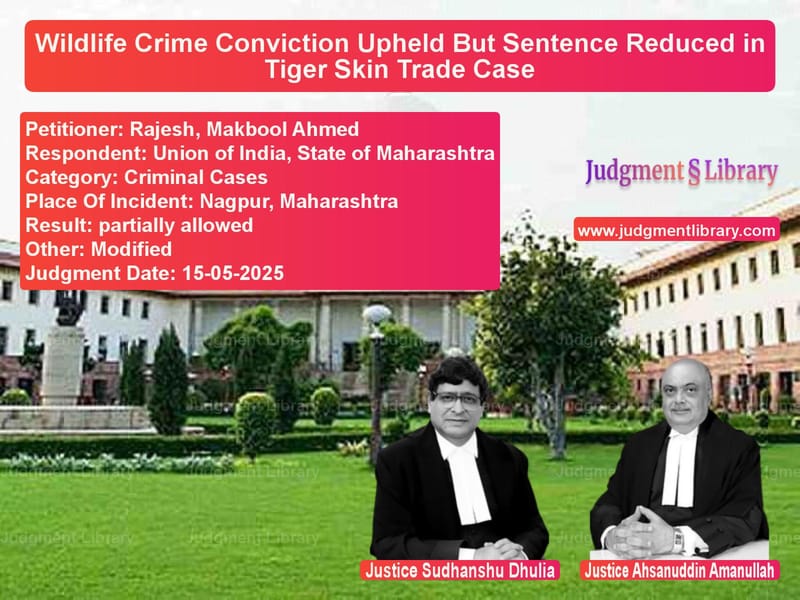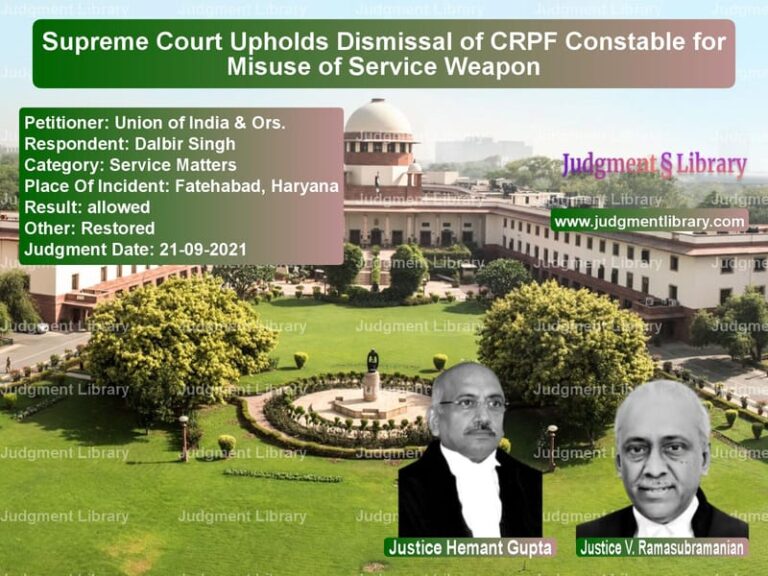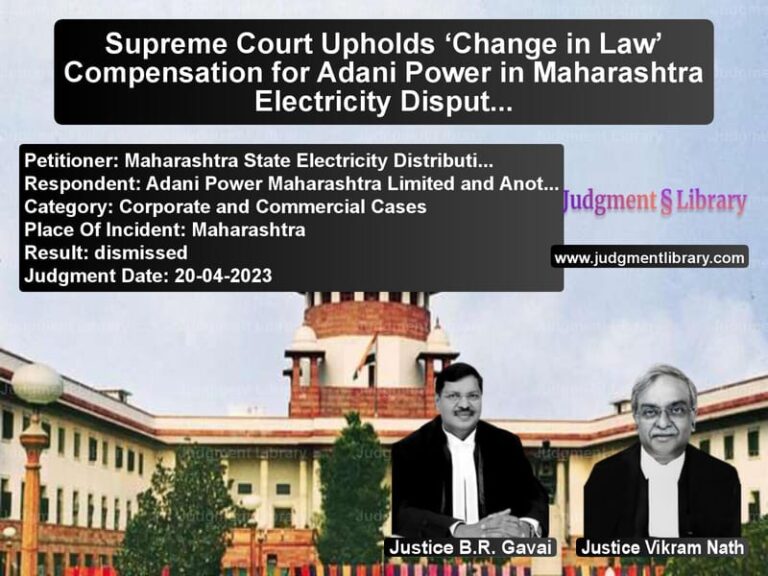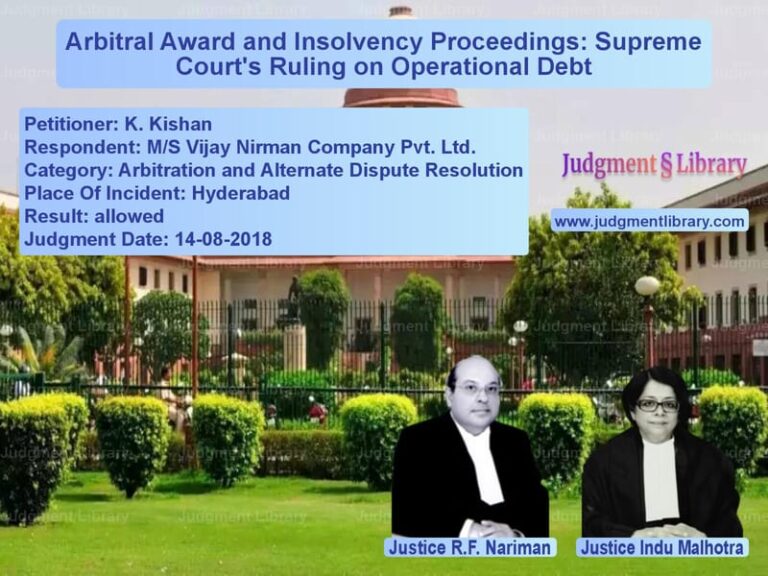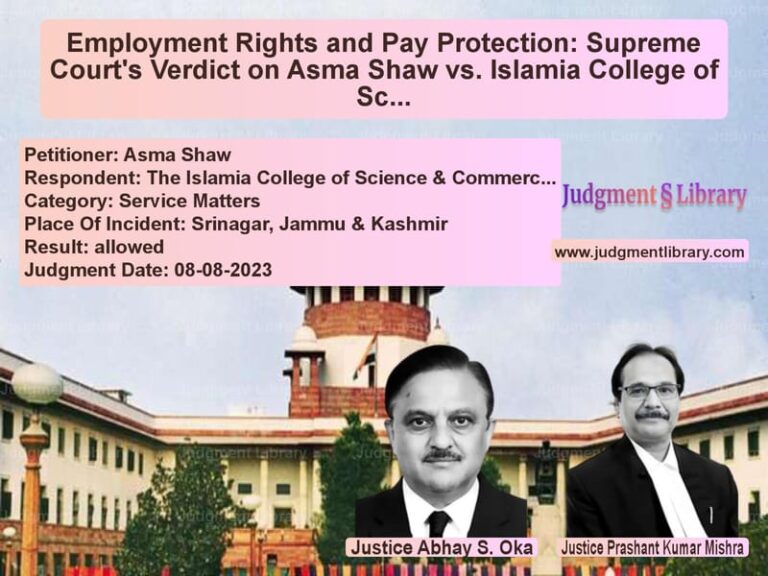Wildlife Crime Conviction Upheld But Sentence Reduced in Tiger Skin Trade Case
In a significant ruling that balanced the strict enforcement of wildlife protection laws with the fundamental principles of criminal justice, the Supreme Court of India recently delivered its judgment in a case involving the illegal trade of tiger skins and other animal parts. The case, which reached the highest court after a long legal battle, underscores the grave threat posed by wildlife crime and the critical importance of a thorough investigation, while simultaneously reaffirming that the standard of “proof beyond reasonable doubt” remains the cornerstone of our legal system.
The story begins in the third week of March 2001 in Nagpur, Maharashtra. The Central Bureau of Investigation (CBI) received secret information that two individuals, Makbool Ahmed and Rajesh, were involved in the illegal trade of tiger skins and wild animal products. The tip-off suggested that the accused were likely to deliver a huge quantity of these banned items to unknown persons at a specific petrol pump on Kamptee Road. Acting on this information, a CBI team, led by Inspector A.K. Bassi, sprang into action. They reached Nagpur and made necessary preparations, including requisitioning independent witnesses from government offices to ensure the integrity of their operation.
On March 21, 2001, the CBI team, along with the independent witnesses, reached the designated petrol pump. Around 4:30 PM, their informant pointed out a silver-coloured Maruti Esteem car parked at the petrol pump, indicating that the accused were inside. The team immediately moved in, intercepted the car, and disclosed their identity. With the help of the petrol pump manager, who also agreed to act as a witness, they conducted a search. What they found was shocking. From the car, they recovered a tiger skin, antler horns, claws, teeth, tiger bones, and skulls. The items were meticulously sealed, a recovery memo was prepared, and both accused were arrested on the spot. The next day, a formal First Information Report (FIR) was registered under the relevant sections of The Wild Life (Protection) Act, 1972.
The case proceeded to trial before the Chief Judicial Magistrate (CJM) in Nagpur. After considering the evidence, the CJM, in 2007, found both accused guilty. They were convicted and sentenced to undergo six years of rigorous imprisonment and pay a fine. Unconvinced, the accused appealed to the Sessions Court, which dismissed their appeals in 2013. They then took their case to the Bombay High Court, which also upheld their conviction. Left with no other option, they approached the Supreme Court, challenging the High Court’s order.
The Arguments Before the Supreme Court
The lawyers for the appellants, Makbool Ahmed and Rajesh, presented several key points to contest their conviction and seek either an acquittal or a reduction in their sentence.
They first raised doubts about the prosecution’s story. They pointed out that according to some witness accounts, four persons were initially apprehended, but two were let go. This, they argued, cast a shadow of doubt on the CBI’s claim that only the two appellants were found in the car. They further highlighted a discrepancy in the sequence of events. One witness stated that a silver-coloured car arrived at the petrol pump in his presence, whereas the prosecution’s case was that the car was already parked there before the raiding team arrived. This was a vital contradiction, they contended.
The appellants’ counsel argued, “It was urged that, therefore, the case set up by the CBI, that only two persons were found in the car and were apprehended, is doubtful.” They further elaborated on the discrepancy, stating, “Learned counsel contended that this will be a vital aspect casting doubt on the veracity and reliability of the trap, for the reason that if the vehicle was already present in the parking space at the Petrol Pump, then the time taken for the CBI team to assemble and then go to the Petrol Pump, which as per the trap team, itself was within half an hour’s reach, there is no explanation as to why the persons who were slated to come to collect the incriminating products never turned up, nor did the team wait for the supposed buyer(s) to turn up, as the specific information was that illegal products were going to change hands.”
The defense also questioned the very nature of the recovery. They pointed to conflicting versions about how the appellants were apprehended. “Learned counsel contended that even here, there is divergence and contradiction in the prosecution case itself, inasmuch as, according to one version, it is stated that the appellants were caught from the car, whereas the other version is that they had run away and then four persons were caught, amongst which two were released after questioning but the appellants were caught. Thus, it was contended that if the appellants had run away, the whole nature of conducting of the trial would change as the recovery would not be from their conscious possession, whereas if they were caught in the car, then the recovery could be said to have been from conscious possession.”
Another major criticism leveled against the prosecution was the lack of a comprehensive investigation. The defense argued that the CBI failed to trace the entire chain of the illegal trade. “Furthermore, learned counsel submitted that whenever products made/comprising wild animals are recovered, the first and foremost course of action for the investigation agency is to connect the recovery to the supplier of the said material(s). In the present case, only a vague statement is made that the appellants disclosed that supplier was one Madhu, but the said person could not be traced out by the prosecution. Thus, besides the supplier, the place from where it was procured has also not been gone into and most importantly, the person(s) to whom the materials were intended to be sold is not even mentioned in the entire investigation.”
The defense also found the appellants’ behavior, as per the prosecution’s timeline, to be illogical. “It was the submission that the time-gap of almost two hours when the trap team got information of the silver-coloured car being parked in the parking lot of the Petrol Pump and the actual raid conducted by them, there was no explanation as to why the appellants should have stayed and waited when nobody turned up to collect the so-called animal goods. Thus, learned counsel contended, in the normal course of events when such huge quantity of illegal animal products were in the car, the appellants, if involved, would not have waited for such long period as such transactions would happen quickly, so as to prevent any unexpected interception.”
Finally, as an alternative plea, the defense requested a reduction in the sentence. “Learned counsel, in the alternative, argued that if the Court does not find favour with the submissions canvassed on the point of benefit of doubt, then, at the very least, reduction in quantum of sentences be considered, as the appellants were young at the time of the alleged offence(s). Learned counsel submitted that this Court may consider imposing lesser sentence as prescribed under the Act i.e., of 3 years, in case we were not inclined to acquit the accused by overturning the Impugned Judgment.”
On the other side, the counsel for the CBI and the State of Maharashtra defended the convictions. They argued that the courts below had thoroughly examined the evidence and correctly found the appellants guilty. Interestingly, they even expressed a view that the sentence was too lenient. “Learned counsel for the CBI submitted that the Courts below have considered the issues arising herein from all possible angles, rightly recorded conviction and handed down sentence. It was also submitted that in the facts of the case, where there has been huge recovery of illegal animal products and in view of the need to ensure proper preservation of wildlife, the maximum sentence of 7 years ought to have been awarded, but the Courts below took a lenient view, by awarding only six years’ Rigorous Imprisonment to the appellants. It was advanced that the appeals be dismissed.”
The Supreme Court’s Analysis and Reasoning
The Supreme Court bench, comprising Justices Sudhanshu Dhulia and Ahsanuddin Amanullah, began its analysis by acknowledging the critical importance of wildlife protection. The court quoted directly from the Statement of Objects and Reasons of The Wild Life (Protection) Act, 1972, to highlight the legislative intent behind the stringent law: “‘The rapid decline of India’s wild animals and birds, one of the richest and most varied in the world, has been a cause of grave concern. Some wild animals and birds have already become extinct in the country and others are in the danger of being so… The existing State laws are not only out-dated but provide punishments which are not commensurate with the offence and the financial benefit which accrue from poaching and trade in wild life produce.’”
The judges emphasized the contemporary relevance of these concerns, stating, “The present lis concerns offences under the Act. It need not be over-emphasised that in the present times, the area left open to the wildlife ecosystem is diminishing everyday due to massive urbanisation, colonization, industrialisation and land-use for various commercial purposes, the threat of wild life, flora and fauna, vanishing and even becoming extinct is real and not imaginary. Thus, no doubt, a very strict approach is required to be taken by the concerned Governments and authorities. If guilt of the accused is established beyond reasonable doubt for any offence under the Act, the punishment meted out should be appropriate and commensurate to the offence, as laid down in the Act.”
However, the court was quick to add a crucial caveat, reinforcing a foundational principle of criminal jurisprudence: “However, having stated the above, the standard of ‘proof beyond reasonable doubt’ still holds the field. Any infringement on the life and liberty of an accused should only be countenanced when the prosecution meets the standard supra.”
Delving into the specifics of the case, the Supreme Court agreed with many of the criticisms leveled by the defense against the investigation. The judges found the probe to be lacking in several respects. “In the present scenario, much can be said about the vague investigation which shows that it has been open-ended without delving into the relevant aspects which were necessarily required to be gone into. Going by the prosecution version, huge quantity of banned/illegal animal products having been recovered, it would obviously mean that there would have been a supplier (either the ‘Madhu’ adverted to earlier, or someone else) of the seized products, and prospective buyer(s), since the prosecution itself stated that the products were to be handed over to some other person. What we can gather is that the CBI team did not have the patience to wait for the transaction to reach its logical conclusion, as the interception of only the accused took place. With regard to the supplier, it is apparent that no investigation in this behalf was pursued by the CBI. It has not even been indicated as to how the appellants were involved with and had links with the trade.”
The court also noted shortcomings in the forensic analysis. “Even the Forensic Report prepared by the Wildlife Institute of India only mentions that the material belonged to tiger, panther, leopard, hyena, chital but the age of the animal products was not determined.” Summarizing its view on the quality of the investigation, the bench observed, “This, in our view, indicates a casual approach in conducting the investigation. It is gainsaid that in matters of the like herein, the first and foremost duty is on the investigators, including the responsibility of ensuring full and proper forensic tests as also in-depth investigation which encompassing all possibilities, such that the chain of events from the beginning till the end is complete.”
Despite these significant lapses in the investigation, the Supreme Court ultimately found that the core of the prosecution’s case remained intact. The key factor that swayed the court was the presence and testimony of independent witnesses. “From the testimonies of the witnesses, it is clear that the appellants were arrested on the spot. Further, recoveries were made from the appellants in the presence of PW1 and PW2 who were independent witnesses and unconnected with the trap team. PW1 and PW2 were not part of the CBI team. As noted hereinabove, PW2 had been nominated by the Regional Labour Commissioner, Nagpur at the request of the CBI. Mr. Rambhau Mangruji Kuthe/PW1 was the Manager of the Petrol Pump. As such, they can be termed uninterested neutral witnesses. On the anvil of the materials which have surfaced during trial, especially the depositions of the witnesses, we are of the opinion that the prosecution has succeeded in connecting the recovery of the materials to the appellants. PW1 and PW2 were subjected to cross-examination, but the substratum of their testimonies has not been dislodged. Thus, the convictions do not require to be interfered with and stand affirmed.”
The Final Judgment and Reduction in Sentence
While upholding the conviction, the Supreme Court showed leniency in the matter of sentencing. The bench considered the appellants’ youth at the time of the offense and the fact that they were not accused of being the actual poachers. “Coming to the quantum of sentence, it is evincible that the appellants at the time of the offence were young in age. Moreover, it is also not the case of the prosecution that the appellants had themselves poached/killed the animals whose bones/claws/antlers/products were recovered. Viewed thus, we are inclined to reduce the period of the sentences awarded by the Courts below.”
The court modified the sentence from six years of rigorous imprisonment to three years of simple imprisonment. The fine amount was increased from Rs. 5,000 to Rs. 25,000 for each appellant, to be paid within eight weeks. Failure to pay the fine would result in an additional three months of imprisonment. In a significant directive, the court ordered that the fine amount be deposited with the Secretary of the Animal Welfare Board of India, ensuring that the money would be used for wildlife conservation purposes.
This judgment serves as a powerful reminder of the seriousness with which Indian courts view crimes against wildlife. It underscores the nation’s commitment to protecting its endangered species and biodiversity. At the same time, the ruling demonstrates the judiciary’s careful balancing act – enforcing environmental laws stringently while safeguarding the fundamental rights of the accused and ensuring that justice is tempered with mercy where circumstances warrant. The Supreme Court’s decision to uphold the conviction sends a strong deterrent message to those involved in the illegal wildlife trade, while the reduction in sentence acknowledges the principles of proportionality and rehabilitation in our criminal justice system.
Petitioner Name: Rajesh, Makbool Ahmed.Respondent Name: Union of India, State of Maharashtra.Judgment By: Justice Sudhanshu Dhulia, Justice Ahsanuddin Amanullah.Place Of Incident: Nagpur, Maharashtra.Judgment Date: 15-05-2025.Result: partially allowed.
Don’t miss out on the full details! Download the complete judgment in PDF format below and gain valuable insights instantly!
Download Judgment: rajesh,-makbool-ahme-vs-union-of-india,-stat-supreme-court-of-india-judgment-dated-15-05-2025.pdf
Directly Download Judgment: Directly download this Judgment
See all petitions in Drug Possession Cases
See all petitions in Theft and Robbery Cases
See all petitions in Fraud and Forgery
See all petitions in Extortion and Blackmail
See all petitions in Money Laundering Cases
See all petitions in Judgment by Sudhanshu Dhulia
See all petitions in Judgment by Ahsanuddin Amanullah
See all petitions in partially allowed
See all petitions in Modified
See all petitions in supreme court of India judgments May 2025
See all petitions in 2025 judgments
See all posts in Criminal Cases Category
See all allowed petitions in Criminal Cases Category
See all Dismissed petitions in Criminal Cases Category
See all partially allowed petitions in Criminal Cases Category

